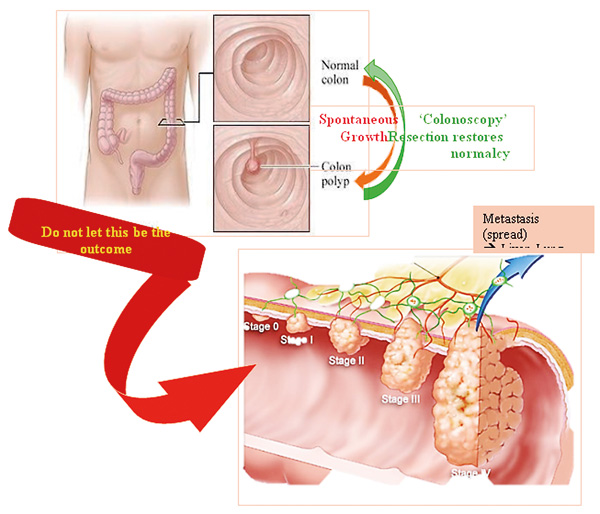Colorectal cancer on the rise in Sri Lanka
“The burden of colorectal cancer in Sri Lanka is on the rise and up to a third of colorectal cancers occur in those under the age of 50 years”. If every vulnerable male / female, aged over 40 years had regular screening tests, a significant percentage of deaths from colorectal cancer could be avoided.
| Findings of study The prevalence of colorectal cancer and survival related to Sri Lanka was a subject of study by a team of medical / surgical specialists led by Professor Kemal Deen. According to the findings of this study; (a) The current national crude annual incidence of colorectal cancer is 3.2 per 100,000 in women and 4.9 in men, With ageing and living with colon cancer precipitating factors (mentioned above) can make the colon produce ‘polyps’. Polyps seen under a sigmoidoscope (colonoscope) must be surgically removed to regenerate the normal colon architecture. Failure to do so can lead to transformation of polyp (adenomatous polyps) to colon cancer. Further, negligence may make the cancer progress stage-wise into the final stage (Stage IV). Concurrently cancer cells can spread to other body tissues such as lungs and liver (metastasise), making treatment ineffective. | |
-Professor Kemal Deen
The man lived in my neighbourhood and was a friend. He was strong and well built, tall, dark and handsome. He was in his late fifties when to everyone’s surprise he died. His family said that months prior to his death he complained of mysterious weight loss, stomach pain, change in bowel habits, persistent feeling of a need to pass a motion. When he could not bear the symptoms any more, he reluctantly sought medical help.
The Medical Specialist thoughtfully considering the patient’s history and the examination findings requested two straightforward investigations. The first was a faeces (stool) examination for ‘Occult Blood’; the second, a ‘Colonoscopy’.
The laboratory report showed the patient’s faeces contained traces of blood. Traces of blood not visible to the naked eye, but detected with a sensitive chemical test (FOBT). The colonoscopy revealed that the patient had growths projecting into the lumen of the colon, almost blocking the bowel path.
 The growths were then surgically removed. The surgically removed tissue (biopsy) was sent for pathological evaluation. The diagnosis was that the patient had ‘Colorectal Cancer’. Further to the surgical removal of cancer tissue, the patient received anticancer treatment. However, this type of cancer being highly invasive, had got implanted in distant body tissues. He did not live more than a few months!
The growths were then surgically removed. The surgically removed tissue (biopsy) was sent for pathological evaluation. The diagnosis was that the patient had ‘Colorectal Cancer’. Further to the surgical removal of cancer tissue, the patient received anticancer treatment. However, this type of cancer being highly invasive, had got implanted in distant body tissues. He did not live more than a few months!
This patient had sought treatment too late.
Colorectal cancer – diagnostic tests
It must be borne in mind that early-stage colorectal cancer does not always cause symptoms. Hence all persons with a family history of colorectal cancer must undergo screening tests for colorectal cancer.
Colorectal cancer (colon cancer) can be detected even before symptoms appear. A change in bowel habits, blood in stools, stomach pain / cramps, unexplainable weight loss, persistent feeling of a need to pass stoolsl are tell-tale signs of the likelihood of colorectal cancer. If detected early and treated, colorectal cancer need not be a cause of intractable suffering and untimely death.
In MediScene of Sunday, May 17, this year, Consultant Physician, Dr. Upali Weragama wrote about “Undergoing a colonoscopy? Here’s what you’ve got to know” where he defined colonoscopy as a non-threatening procedure that we should not be apprehensive about.
The faecal occult blood test (FOBT) is a simple test – it requires samples of faeces (collected at home) brought to the laboratory. The test is best done annually. The decision for Colonoscopy depends on the outcomes of the FOBT.
You should be screened
If you:
n Have a family history of colorectal cancer or colorectal polyps. (Those whose close relatives had been diagnosed with colorectal cancer or polyps),
- a history of breast or ovarian cancer,
- are obese leading a sedentary (physically inactive), modern-day life style,
- consume alcohol excessively,
- are a cigarette smoker,
- take an aberrant diet,
- suffer from inflammatory bowel disease (e.g.ulcerative
- colitis, Crohn’s disease),
- Are a diabetic (Type II).
If you have one or more of the above predisposing features you could likely be a candidate for colorectal cancer in time to come. You may be predisposed to consequences of colorectal cancer at the prime of your life, unless precautionary measures are taken. Early screening is thus a precautionary measure.
Reasons to do a colorectal cancer screen
Peace of mind that you are free from evils of colorectal cancer,
Detect precancerous (adenomatous) colon polyps (if present) that can be removed (polypectomy / excision through colonoscope) before these turn into cancer, Find colorectal cancer early, for that’s when treatment works best.


